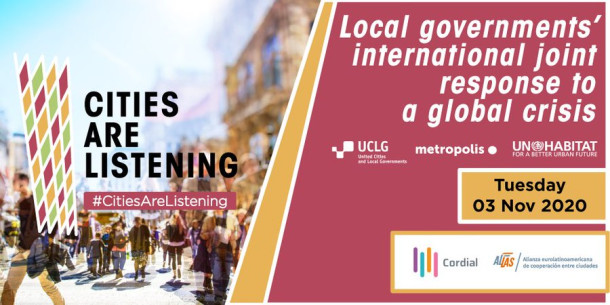
What’s next for city networks following the pandemic?
Over recent years, the international ecosystem of city networks has expanded in both number and diversity. This is the result of the growing role that local and regional governments play in influencing people’s quality of life, but it also reflects the challenges and threats that have been accentuated by the impact of the global COVID-19 pandemic. In this context, on 3 November, together with the Euro-Latin American Alliance for Cooperation between Cities (AL-LAs) and United Cities and Local Governments (UCLG), we invited representatives from all types of city networks to reflect on our role as platforms for the transformation of cities, raising their voice on global agendas, and promoting initiatives that improve the quality of life of city communities.
The session was organised within the framework of #CitiesAreListening Experiences, an initiative run by Metropolis, UCLG and UN-Habitat, featuring a series of exchanges between cities and other urban actors. The aim is to define joint actions that help respond to the main urban challenges resulting from the global pandemic—before, during, and eventually after.
Attendees had the opportunity to discuss the impact of COVID-19 on the city network ecosystem and discuss potential visions for the future.
One of the outstanding achievements of the session was that it brought together a highly representative sector of the ecosystem of networks, including CIDEU, C40, CLGF, Platforma, Mercosur Cities Network and CIDOB. This sparked a debate with a great range of perspectives, not only thanks to the geographical scope covered, but also due to the different areas of action.
The Technical Director of AL-LAs, Paola Arjona, who was in charge of moderating the session, began the debate by highlighting the need to rethink and redesign city networks in the wake of COVID-19. Rosa Arlene María, Executive Director of CIDEU, pointed out the exceptional challenge of responding in a timely manner to the demands of cities in a context of permanent change. At the same time, she added that the new global context has allowed for a certain democratisation in terms of city network participation, offering a greater scope for cities to take part that were previously not very visible on an international scale.
Meanwhile, Emmanuelle Pinault, director of the C40 City Diplomacy programme, expressed regret that the challenges derived from COVID-19 might push climate action projects to the sidelines, and pointed to the importance of recovery plans that incorporate actions to build more sustainable societies.
Greg Munro, Secretary General of the Commonwealth Local Government Forum, shared the need for different networks to complement each other. Based on the broad ecosystem of city networks, the different areas of action in each one will make it possible to address the needs of cities in a more complete and sustainable way.
The second section of the debate was dedicated to identifying synergies and future challenges and opportunities. Metropolis Secretary General, Octavi de la Varga, highlighted that although the degree of cooperation between networks increased to provide a rapid response to the needs of cities at the beginning of the pandemic, the prolongation of the crisis may see us return to previously common bad practices, such as overlapping between networks and developing competitive relationships instead of complementing each other.
Following on from this, Emilia Saiz, Secretary General of UCLG, shared that, although decentralisation has been a focus point for city networks since the beginning, in the current context it is necessary to introduce a series of changes so that this nexus is truly transformative for society, such as making better use of spaces for global advocacy through the particular features of each of the networks.
Finally, the third section of the session was aimed at highlighting the role of city networks in international governance systems and the importance of having a place on a global level. The Secretary General of Mercosur Cities Network, Jorge Rodríguez, spoke about the role of networks as facilitators so that local and regional governments can have a voice in global and regional spheres, rather than the networks having a voice themselves. According to Rodriguez, rather than duplicating efforts, networks should improve the way they manage communication with member cities.
According to Marlène Siméon, director of Platforma, it is essential to create alliances between local and national governments, in order to encourage a multilevel dialogue. The global pandemic has allowed institutions to recognise the role of networks, but they still fail to integrate them in decision-making processes.
The session was brought to a close by Agustí Fernández de Losada, Director of the Global Cities program at the CIDOB, who remarked that it has become clear that there is a certain distance between the narrative of networks, city agendas and the capacities to operate. This distance presents a challenge, and needs to be resolved. He also highlighted the need to move towards a system that is totally different from the traditional multilateralism we have today, and to develop a system that ensures the inclusion of communities.

